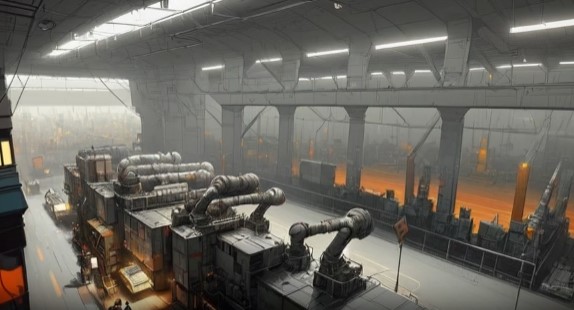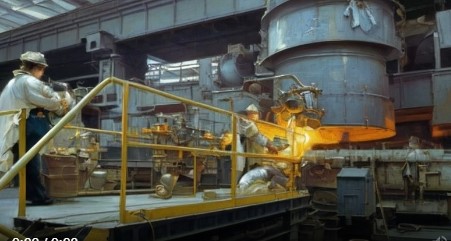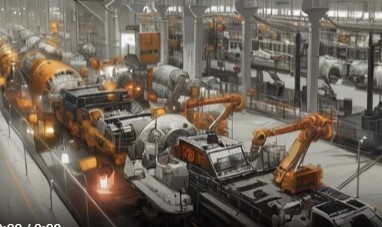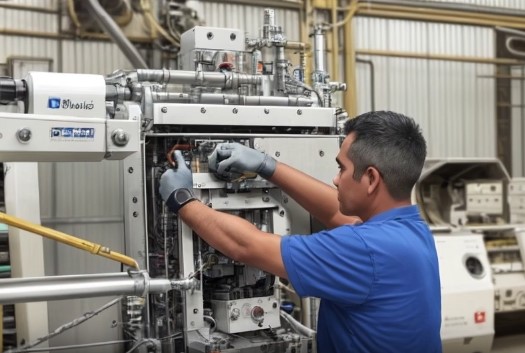In the bustling world of manufacturing, machinery is the beating heart that drives production. Europe, with its long history of industrialization and a rich tapestry of diverse economies, is a significant player in the machinery market. This market is not only about the production and sale of new equipment but also about the vibrant trade of used machines. This article will take a deep dive into the machinery market in Europe, focusing on the resale of machines, the impact of large manufacturers, and the role of various market players such as resellers, auctioneers, and marketplaces.

Machinery Market in Europe: An Overview
The European machinery market is a vital segment of the global machinery industry, contributing around 30% of the worldwide revenue as of 2022, according to Statista. This market encompasses many sectors, from construction and agriculture to food processing and packaging. While Germany leads the pack, countries like Italy, France, and the United Kingdom also host robust machinery markets.
The European machinery industry is known for its innovation, quality, and diversity. For instance, the German machinery industry, with giants like Siemens and Bosch, is renowned for its high-tech products and a strong focus on R&D. Italy, on the other hand, is famous for its packaging and food machinery, with top manufacturers such as GEA and IMA Group.

The Resale Market: A Second Life for Machines
While new machinery occupies a significant share of the market, used machinery has carved out its niche. This is the realm of the resale market, where machines get a second, third, or even fourth life. The used machinery market in Europe is valued at around €25 billion, according to a 2023 report from Frost & Sullivan.
The resale market is driven by several factors. First, the cost of new machinery can be prohibitively high for many businesses, particularly SMEs. Second, high-quality used machinery often delivers comparable performance at a fraction of the price. Third, the resale market is more environmentally friendly as it extends the lifecycle of machines, reducing waste.
There are also challenges in the resale market. The primary one is ensuring the quality and safety of used machinery. It’s here that the role of resellers, auctioneers, and marketplaces becomes crucial.
Resellers, Auctioneers, and Marketplaces: Key Players in the Resale Market
These three types of players have distinct roles in the resale market, but they all serve the same purpose: facilitating the sale and purchase of used machinery.
Resellers are typically companies or individuals who buy used machines and sell them to other businesses. They play a critical role in ensuring the quality of the machines, often offering services like inspection, refurbishment, and warranty.
Auctioneers, like Ritchie Bros. and Surplex, operate on a different model. They conduct auctions, both live and online, where businesses can bid on used machinery. The competitive nature of auctions can result in lower prices, but buyers need to be savvy and have a good understanding of the machinery’s worth.
Online marketplaces, such as Exapro and Kitmondo, have transformed the resale market by offering a platform for sellers and buyers to connect directly. They provide a wide range of options and pricing transparency, making it easier for businesses to find the right machinery at the right price.
Largest sectors in terms of machinery production
the largest sectors in terms of machinery production in Europe are as follows:
Automotive: The automotive industry is one of the biggest consumers of machinery and automation equipment. Germany is a significant contributor in this area, housing major automakers like Volkswagen, BMW, and Mercedes-Benz, which rely heavily on advanced machinery for production.
Industrial Machinery: This sector encompasses a wide range of machinery used across various industries, including machine tools, pumps and compressors, ventilation equipment, and more. It is a sector where Europe, led by Germany and Italy, is particularly strong.
Food and Beverage Machinery: Europe is a global leader in the production of machinery for the food and beverage industry. This sector demands a wide range of machinery for processes like food processing, packaging, and bottling. Countries like Italy and Germany excel in this sector.
Agricultural Machinery: Europe, with its strong agricultural sector, is a significant player in the production of agricultural machinery. Major European manufacturers include Germany’s Claas and AGCO’s Massey Ferguson, based in the UK.
Construction Equipment: The construction industry requires heavy machinery, and several European countries have prominent manufacturers in this sector. Volvo Construction Equipment (Sweden), Liebherr (Germany), and JCB (UK) are among the top in this sector.
Plastics and Rubber Machinery: This sector involves machinery for the processing and forming of plastics and rubber. Germany is the leading producer in this sector, followed by Italy.
The Future of the Machinery Market in Europe
Looking ahead, the machinery market in Europe is expected to continue growing, driven by factors like technological advancements, increasing automation, and the shift towards more sustainable production methods. The resale market is likely to keep pace with this growth, given the economic and environmental benefits of used machinery.
With the rise of Industry 4.0, we can also expect more digitalization in the resale market, with AI-powered platforms, virtual inspections, and blockchain-based certifications becoming more commonplace.
Preserving a European Industry
The manufacturing sector is a major contributor to Europe’s economy, accounting for over 20% of the gross domestic product (GDP) and employing approximately 30 million people, according to Eurostat data from 2022. This sector is diverse, encompassing everything from automotive and industrial machinery to pharmaceuticals and high-tech electronics. Countries like Germany, Italy, France, and the United Kingdom are well-established manufacturing powerhouses, while others, such as Poland and the Czech Republic, have emerged as significant players in recent years.
However, Europe’s manufacturing sector is not without its challenges. These include increasing competition from Asia and America, the pressure to adapt to digitalization and automation, and the need to transition to greener and more sustainable production methods.

The Need for Independence
In today’s interconnected world, no economy is an island. International trade is a fact of life, with raw materials, components, and finished products flowing across borders. However, there is a growing recognition in Europe of the need to maintain a certain level of manufacturing independence.
This need has been underscored by recent global events. The COVID-19 pandemic, for instance, revealed vulnerabilities in global supply chains, with shortages of critical medical supplies and disruptions in various industries. Similarly, geopolitical tensions and trade disputes have highlighted the risks of over-dependence on foreign manufacturing.
Maintaining manufacturing independence is not about isolation or protectionism. It’s about having the capacity to produce critical goods domestically, ensuring a stable supply in times of crisis, and safeguarding jobs and technological know-how.

The Future of Manufacturing in Europe: A Path to Independence
How can Europe preserve its manufacturing capabilities and ensure its independence in the future? Here are some key strategies:
- Investing in Innovation and R&D: The future of manufacturing lies in advanced technologies like artificial intelligence, robotics, and the Internet of Things. By investing in research and development, Europe can stay at the forefront of these technologies, driving innovation and competitiveness.
- Fostering Skills and Education: The manufacturing jobs of the future will require new skills, from data analysis to robotics. Europe needs to invest in education and training to equip its workforce with these skills, preventing a brain drain to other regions.
- Strengthening Supply Chains: Europe needs to make its supply chains more resilient. This could involve diversifying suppliers, stockpiling critical goods, and using technologies like blockchain to increase transparency.
- Embracing Sustainable Manufacturing: Sustainability is no longer a nice-to-have; it’s a must. By leading the way in sustainable manufacturing, Europe can meet regulatory requirements, cater to changing consumer preferences, and reduce dependence on fossil fuels.
- Supporting SMEs: Small and medium-sized enterprises (SMEs) are the backbone of Europe’s manufacturing sector. Policies should support these businesses, from reducing bureaucratic hurdles to providing financial support.
Exapro, the online marketplace for used machinery, plays a significant role in modern European industry. Its platform bridges the gap between sellers and buyers of used industrial equipment, facilitating transactions across borders while saving resources. With a broad inventory that spans sectors such as food processing, metalworking, woodworking, pharmaceuticals, and more, Exapro democratizes access to machinery. It provides an opportunity for businesses, particularly small-to-medium-sized enterprises, to acquire quality equipment at a fraction of the cost of new machinery. Moreover, it contributes to the circular economy, extending the lifecycle of machines and promoting sustainability. Through its role in the resale market, Exapro bolsters the resilience and competitiveness of the European industry, contributing to its independence and growth.



